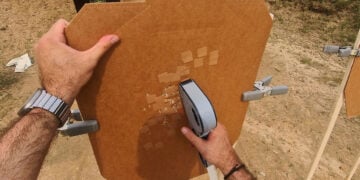Table of Contents
Recently, I was fortunate to meet and talk in depth with a knowledgeable Russian citizen. He was a gun aficionado who was attending one of my gun classes. He was also a student at a college near me here in Florida on a Student Visa. His name is Evgeny A. and prefers Eugene as a nickname. We talked and I researched a lot of the similarities and differences between Russian and U.S. firearms laws including:
- Concealed Carry
- Related requirements for ownership
- Use and licensing
- Gun and ammo restrictions
- Attitudes of citizens
- Specific licensing and training documents and procedures
- Weapons laws
- Types of guns
- Regulations
- And so much more
I explored some of the answers and references he gave me, researched some Russian laws and processes, and read some helpful information from Russia Beyond, Russia Today, the CIA: World Factbook on Russia, other websites, and our Library of Congress. So some of this article is based on Russian information from Eugene and other Russian sources. I did notice that there was some conflicting information among the various Russian sources and websites. But, I learned a lot of new and interesting information about guns and ammo in Russia. Here is just a small part of what I discovered.
01
of 02
Did You Know in Russia at this time?
- There is only one Federal law regulating firearms and no state laws
- You cannot own a short-barreled handgun for self-defense
- Applying for a gun license requires a psychiatric evaluation
- Russian mass gatherings, protests, and public events at educational institutions prohibit firearms
- You can only own up to ten licensed firearms with a purchased license. The license is valid for five years (other than ones that fire rubber bullets)
- Local police must visit gun owners’ residences at least once a year to verify the safe storage of guns.
- For initial and renewal licenses, applicants must attend a six-and-a-half hours training class. The Russian government offers the class and applicants must pass written tests.
- Federal law prohibits using a firearm against women
I drafted my nine main questions with sub-questions and present them here below, followed by what I learned. Much of this is taken from the Russian Federal Law on Weapons and other published materials, websites, and Eugene. I want to specifically thank Eugene and wish him well in his learning experiences here in the U.S.
Here are my questions and summary answers about guns in Russia:
1. What Federal, State, or Local Laws and Enforcing Organizations regulate firearms and ammo in Russia?
The Federal Law on Weapons is the main law that regulates the acquisition, transfer, and use of firearms in Russia. This sole federal law for the entire Russian Federation sets forth the major principles, criteria, and rules for acquisition. It also covers possession, and use of firearms, and implementing regulations. There are no separate state and local laws or individual jurisdiction regulations, just federal laws. There are other specific federal legal acts and laws with relevant provisions for specific topics and areas. For example, federal laws on education, licensing activities, state protection, counter-terrorism, and the Criminal Code of the Russian Federation.
The main goals of the Federal Law on Weapons and related legislation is to:
- Regulate the circulation of guns depending on the weapon’s functional purpose, i.e., for self-defense, hunting, or sports activities purpose)
- Maintain a licensing system that allows government monitoring of all operations with legally acquired guns.
The Law on Weapons establishes the criteria for individuals who intend to acquire guns applying for a gun permit. Local police authorities issue these gun permits. This law also strictly regulates the type and quantity of firearms an individual may have in their private possession. The federal law and existing legislation also apply to the circulation and limitation of ammunition and cartridges for all firearms.
2. Who can purchase a handgun or other firearms in Russia? What are the specific procedures, requirements, and limitations? Does someone issue a license? Is there a gun registration? If so, with whom? Are there background checks, residency requirements, age requirements, medical limitations, etc.?
The Russian constitution guarantees self-defense and protection of your property as a constitutional right for Russian citizens. But Russian legislation strictly defines gun control and ownership. Recent federal law changes allow the ownership and circulation of firearms to Russian citizens for those:
- At least twenty-one years of age
- Who have a registered permanent residence
- Solely for the purposes of strictly-defined self-defense, hunting, and sports activities only
Only state medical clinics can now conduct the psychiatric evaluations required to apply for a gun permit. Now, gun owners who did not take measures to prevent unauthorized access to their guns are imposed criminal penalties. Gun owners caught carrying their weapons while under the influence of drugs or alcohol are subject to fines. Authorities will cancel their concealed carry permit and potentially confiscate their firearm.
Russia did not permit concealed carry by civilians for self-defense for many years. New rules allow individuals who have gun permits to carry certain specified weapons concealed. They can use them for strictly-defined purposes of self-defense. But, the government strictly controls these gun licenses. The license really only serves as a carrying permit for hunting and sports firearms when transporting them.
Hunting, participation in sporting events, and training exercises were the only reason private individuals could carry and use guns. Lawmakers recently expanded the list of weapons individuals can purchase and use for the purposes allowed under the law. They now include changeable rifled barrels.
Obtaining a License to Purchase a Gun in Russia
Acquiring a gun requires getting a license first. Licenses are provided for five years and issued by local police departments. The local police must visit an applicants place of residence to ensure they can safely store the firearms. Then after a very thorough background check, and an evaluation of their medical records, a license may be issued. Each specific type of weapon requires a separate license. And it allows the applicant to acquire and keep up to five different licensed weapons.
Some conflicting information exists about this and, sadly, some police officers take bribes. And some high-ranking officials do order certain lawsuits and processes closed. But, official licensing documents have eleven protection levels, complicating the manufacturing of false documents. Having a mental illness or treatment for substance abuse prohibits you from owning firearms. It is difficult to understand what agency or qualified individual makes those decisions and what specific criteria are used. However, owning a firearm requires safe firearm storage.
Recent Russian Firearm Law Changes
After many years of uncertainty and interpretations of the federal law, in September 2016 and earlier there were new amendments to the Russian Federal Law on Weapons. New requirements were specified for the registration, licensing, and storage of hunting, sporting, pneumatic, and gas weapons and for military and hunting knives. New clarifications and carefully-defined rules allow individuals who have specified gun permits to carry concealed certain weapons and use them for the purpose of self-defense.
The legislation clearly defines possession of firearms in prohibited situations. These are at mass gatherings, demonstrations, protests, and other public events and on the grounds of educational institutions and in entertainment establishments open at night and selling alcoholic beverages. Drunken individuals also cannot carry weapons legally. Under previous laws, the use of long-barreled firearms and knives for self-defense is prohibited.
The amendments make exhibiting and collecting weapons and ammunition in Russia subject to licensing, and new licenses are valid for a six-month period. Developing, producing, testing, storing, repairing, and disposing of civilian and service weapons and ammunition now requires licensing. 5-year purchased licenses allow up to five permitted weapons.
The new amendments require submission of proof of the non-use or possession in the past of narcotic drugs or psychotropic substances, to obtain a license to purchase weapons. Also, submitting a medical report indicating the absence of medical contraindications that would prohibit weapons possession and to pass a drug test every five years is required for gun owners. Another amendment requires authorized weapons and ammunition dealers to report all buyers to the local police agency every month.
3. What specific documents does Russia require for a gun license?
Persons applying for a gun license must submit the following documents to a local police department in Russia, along with an application for a gun license:
- A statement that an individual has no medical contraindications for possession of guns
- Statements issued by boards monitoring psychiatric and substance abuse services within the administrative area where an applicant permanently resides that the applicant was not treated for mental illnesses or drug abuse
- Proof of Russian citizenship
- Two photographs
- Statement from a territorial police officer that weapons can be safely kept at the applicant’s residence (police must visit an individual’s residence to verify safe storage of weapons)
- Hunter’s card
- License fee
- Proof of no less than five-year possession of smooth-bore barrel guns, if applying for a license to purchase rifled-bore barreled guns.
4. What are examples of reasons for denials of gun licenses?
Authorities review applications within one month of an individual’s gun license application. The applicant then has six months to purchase a gun before the expiration of the license. Licenses are not issued to those who cannot guarantee secure storage of weapons, have a court record that has not expired, or have committed at least two minor violations of public order within one year. Individuals without permanent residency in a specific location cannot acquire guns. All weapons must be registered within two weeks after their acquisition. Registration must be conducted by the same police department that issued the license for acquisition. The federal law states that it is the gun owner’s responsibility to make sure that their weapons are stored safely. The local police inspector is obligated under the Law to visit each gun owner’s residence at least once a year for verifications and to review the safe storage of weapons.
5. Is it true that specific diseases or medical conditions can deny citizens gun ownership?
Yes, certain diseases and conditions prevent gun ownership in Russia. Some of the diseases, addictions, and conditions which prevent an individual from having weapons has been established by the Russian federal government and include the following:
- Chronic and long-lasting psychiatric diseases with severe or continuing forms of relapses
- Addictions to alcohol, narcotics, or other toxic substances
- Vision problems of -5 or worse in one eye when another eye is worse than -2, or -7 in one eye if the person is blind in the other eye.
6. Are there training classes and tests required for gun ownership?
Individuals who acquire weapons for the first time in Russia are required to attend six-and-a-half hours of classes on the safe handling of guns offered by organizations designated by the government of the Russian Federation and to pass federal written tests on knowledge of safety rules. A license for weapons acquisition is required to accept guns as a gift or inheritance. Tests must be retaken and passed when an individual applies for license renewal.
7. Approximately how many non-military guns are registered in Russia? Are There many un-registered guns there? Are most Russian crimes committed with unregistered guns?
According to a report by the Russian Ministry of Internal Affairs (police), there were more than 6.3 million non-military weapons registered in the Russian Federation, at the end of 2012 for their population of 142.5 million. This number included 700,000 firearms with a rifled bore and 4.2 million firearms with a smooth bore. According to the same report, the Russian Federation holds approximately twelve million unregistered guns illegally. Russia requires gun owners to register all guns. Police investigated about 26,500 crimes related to the illegal circulation of weapons, at that time.
Unregistered weapons or weapons acquired by a person who used it for criminal purposes make up the majority of the weapons used in crimes according to various reports. While Russia maintains relatively restrictive gun control legislation and strict procedures regulating the purchase and storage of firearms by private individuals, there is a huge black market in Russia for weapons. Most weapons used by criminals are stolen military or police guns, guns sold by law enforcement personnel who seized illegal weapons from criminals and did not register the confiscation of those firearms, or firearms made from modified non-lethal guns, according to a legalization of weapons article on the Russian NewsRU website.
8. Does the Russian constitution allow citizens to defend themselves or their property when attacked? Are there any restrictions or limitations specified in law?
According to the Russian Constitution, “each individual has the right to defend his/her rights and freedoms by all means not prohibited by law.” The vast majority of Russian gun owners have rifles. So, Russian citizens may use weapons that they legally own to protect their life, health, and even property there when necessary. However, criminal legislation almost entirely defines necessity. And it seems that a person who engages in necessary defense may use all measures needed to stop an ongoing attack if the use was proportional to the degree of danger posed by the attacker and the level of damage prevented.
Legal scholars have called for a review of the laws on necessary defense and specific related judicial decisions. Unlike previous laws, the Federal Law on Weapons allows the use of firearms for the protection of personal property. But, the current Russian law does not specify what type of threats to private property would be enough to justify the use of firearms against an individual. There appears to be confusion about this with much subjectivity and interpretations.
Must Not Harm Third Parties
Also, the Federal Law on Weapons states that the use of weapons for necessary defense must not cause harm to third parties. Russian courts had recently found several police officers guilty of injuring bystanders when they used their service firearms to defend themselves and other individuals.
Strict Gun Laws and Less Guns But Higher Murder Rate
While Russia has far fewer guns in circulation than the U.S. and strict gun laws, Russia has a much higher murder rate, according to Russia Today. Russian police also regularly seize guns from the public and melt them down, like recently in the Rostov-On-Don region, according to the website.
Other Prohibitions
Additionally, the Law prohibits using firearms against women, individuals with obvious signs of disability, and minors with apparent or known age. If the individuals mentioned above engage in an armed or group attack an exemption would be a made. Gun owners must report each use of a weapon that involves injury to an individual to the police immediately, no later than within twenty-four hours.
9. What types and numbers of all guns can you legally own in Russia? Is there a round limit on the number of rounds the magazine or gun itself can hold?
The only federal law that governs firearms in Russia, the Federal Law on Weapons, defines three types of firearms based strictly on the purpose for which they are used and their technical characteristics. The three purposes for using a firearm in Russia, as defined by Russian federal law, are Civilian use, Service use, and Combat Firearms and Edged Weapons use.
Service use includes weapons intended for use by officials of government agencies and employees of companies who have been permitted by law to bear, keep, and use arms for self-defense and for performance of the duties assigned to them for protecting individuals and their property, nature and natural resources, valuable and dangerous freight, and special correspondence.
Combat Firearms and Edged Weapons are intended for official operational tasks carried out by federal agencies and services, including the armed forces, police, border protection services, tax police and customs, and some other agencies.
The Federal Law on Weapons strictly defines civilian use of guns for self-defense, hunting, and sports activities. These include smooth-bore long-barreled firearms, smooth-bore long-barreled firearms if the rifled part of the barrel is no longer than 140 millimeters (5.5 inches), and pneumatic weapons with power of up to 25 joules (18.4 foot-pounds.)
The Federal Law on Weapons in Russia prohibits guns with a capacity of over ten rounds. So, a gun’s magazine can hold no more than ten cartridges. At this time for civilians, the Russian law regulates barrel length and overall gun length. Although changes are being considered, now it specifies for civilians that no barrel length shall be less than 500 millimeters (19.685 inches) nor have an overall length under 800 millimeters (39.4961 inches.) Can you imagine a handgun that meets these requirements? Concealed Carry would be very difficult under these requirements.
Note:
Russia generally prohibits owning and bearing long-barreled weapons for self-defense. Legislators are discussing proposals to allow individuals to acquire and carry short-barreled handguns for self-defense, but it appears that it has more opponents than proponents among lawmakers. There is also a consideration for the creation of a national collection of bullet case samples to make it possible to identify a gun used in a particular shooting.
According to recent law revisions, an individual cannot have more than ten guns in their possession, except for guns included in a registered collection of weapons. An individual’s possession of weapons cannot exceed five hunting rifled-bore guns and five smooth-bore long-barreled guns.
02
of 02
Conclusions
Certainly, Russian firearm law and American firearm laws are different and varied. Relevant laws in both countries have changed over the years and are still changing. Goals, priorities, environments, interpretations, culture, politics, survival, and many varying influences affect the evolution, understandings, and results of weapons laws and processes. Hopefully, both countries can learn from each other and recognize meaningful justifications and effective laws as needed to support the rights of individual citizens in each country to have the right to possess and properly use handguns and weapons for self-defense.
There appears to be different interpretations by Russian sources and websites about the sole federal law about firearms, weapons, requirements and concealed carry. While confusion is apparent about the Russian firearms law and practices, recent revisions should be helpful, but currently, verify their status for yourself. It seems that while Russian gun laws are strict, a lot of Russians are concerned about getting food on their tables rather than gun ownership. They will endure the lengthy and involved process to get one if they really want one. It seems we have much to appreciate here in the U.S.
Continued Success!
Photo licensed by i156 LLC
* This personal opinion article is meant for general information & educational purposes only and the author strongly recommends that you seek counsel from an attorney for legal advice and your own personal certified weapons trainer for proper guidance about shooting & using YOUR firearms, self-defense and concealed carry. It should not be relied upon as accurate for all shooters & the author assumes no responsibility for anyone’s use of the information and shall not be liable for any improper or incorrect use of the information or any damages or injuries incurred whatsoever.
© 2019 Col Benjamin Findley. All Rights Reserved. This article may not be reprinted or reproduced in whole or in part by mechanical means, photocopying, electronic reproduction, scanning, or any other means without prior written permission. For copyright information, contact Col Ben Findley at [email protected].









